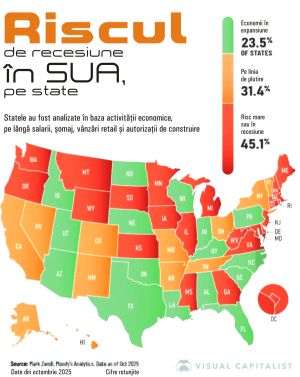Romania has embarrassed itself with the proposals that had been initially prepared for the Juncker plan, said Eugen Teodorovici. Mr. Teodorovici is the president of the Budget and Finance Commission of the Romanian Senate, member of the European Affairs Commission and former minister of European Funds.
He said that, on that list, which was prepared in 2014 by the Ministry of Development, there were local libraries or a ferry for crossing the Danube, and generally minor projects: "The people of the Ministry of Development drew up a «shopping list» - «give us what you have» -, they collected hundreds of projects and sent them to Brussels. The people over there were shocked when they saw what kinds of projects Romania would send in for the Juncker Plan. Other countries would send five-seven major projects, of national interest. We did not do that".
In the opinion of Mr. Teodorovici, within three years at most, Romania can attract 23 billion Euros in European grants, on the new absorption cycle.
He says that a good idea for boosting absorption would be to use the banking system: "For instance we can go with the idea used in the pre-accession: using the banking system. It can take over the role and the functions of the state. During the pre-accession, Romania had a 95% absorption rate on the ISPA (Transportation and Environment) programs, a 95% absorption rate, and at the time we were actually congratulated. I am in favor of an outsourcing to the private sector of what the European funds mean".
Another idea, in the opinion of Mr. Teodorovici, would be to eliminate the "European funds" term, for the public sector workers: "To them, there shouldn't be any difference between European and public funds anymore. Only the citizens should know that a certain project is financed out of European grants, because that is how they will understand the benefit of joining the EU".
In his opinion, the statute of public servants needs to be eliminated and replaced with the contract-based workers, in order for them to prove that they deserve to come in for work on the next day: "When I get back to the public administration, because I certainly will, I am going to eliminate everything that concerns the statute of the public servant, meaning there would only be contractual personnel. It's better for the civil servants to do contract-based work and to prove to the boss that they deserve coming in for another day of work. Having public sector workers brag that they managed to outlast 15 ministers and that they will outlast the current one as well just isn't going to cut it anymore... You will see that they will do a much better job, they won't even have time to breathe. Right now, they allocate very little time for work and the rest for cigarette breaks, Facebook and so on".
The former minister said that currently, an absorption of 800 million Euros for structural projects is being discussed, which were phased during his term: "Meaning, what I phased in 2014 on Infrastructure, Transportation. On the POIM there are about eighty projects, with a value of more than 3 billion Euros. In other words, it is a good thing that on one hand, we are not losing that money, but on the other hand, we kind of fooled ourselves, because in the current financial period, 2014-2020 we are spending what we should have spent on the first financial cycle. We are depriving those who would have done a better job of spending the European grants, of a substantial financial allocation. Not even for the phased projects was a mechanism devised which would allow us to make lump sum payments. Today we are in a worse situation than in the previous financial period".
• "Some people don't understand that when they go abroad, they have to do everything in their power to support the country"
Eugen Teodorovici also said that unfortunately, Romania promotes politicians, who are afraid of competition, rather than specialists, even for the positions of Brussels.
He was asked whether he didn't think it was frustrating that we fail at absorbing European grants, especially as a Romanian - Corina Creţu - is a European commissioner in charge of Regional Policies. He avoided answering outright, but said: "Maybe one day, I will tell you my frustrations and what the Romanians sent to Brussels are like. Some people don't understand that when they go abroad, they have to do everything in their power, within the limits of the law, to support this country. They all do the same.
That individual which coordinates a number of countries can decide to resolve Romania's issues on areas such as Schengen, even concerning visas, and many others. I don't have to tell you how they can do that. If you want to do something good for the country, you do it. You have to want to do it, you have to be sufficiently astute.
Furthermore, we don't need anybody from the outside to teach us. We have the pre-accession examples... the main advantage that came with the European grants was the know-how, not necessarily the financial side. Together with the European grants, come the principles, the mentality, a different approach.
We can attract European funds, we have demonstrated that we have that possibility.
But Romania doesn't understand that it needs to put to work people who know how to do things, not necessarily Teodorovici, there are a bunch of professionals in the market. We can find hundreds of people who can radically change the system. Romania doesn't want to give them a chance, because that is how it works, with politicians, who are afraid of competition".
• "I want the creation of a development bank, along the structure of EximBank and CEC Bank"
The former minister brought up the idea of creating a development bank in Romania. He said: "I wanted the creation of a development bank in Romania, and when I was in the Finance Ministry, in 2015, I even initiated a draft law in that regard. Subsequently, I submitted as a draft law in the Parliament. The idea was to create a development bank, along the structure of EximBank and CEC Bank. We were told from the Finance Ministry that the European Commission has asked for a feasibility study. In Romania there are always feasibility studies needed for ideas that in other countries just work".
In the opinion of Mr. Teodorovici, those who are glad that at the end of a period Romania has been successful in attracting 80-100% European funds, don't understand the situation: "The money needs to come in in the beginning of the period".
He told businesspeople that the system won't change itself and that he will have to ask for his rights.




























































